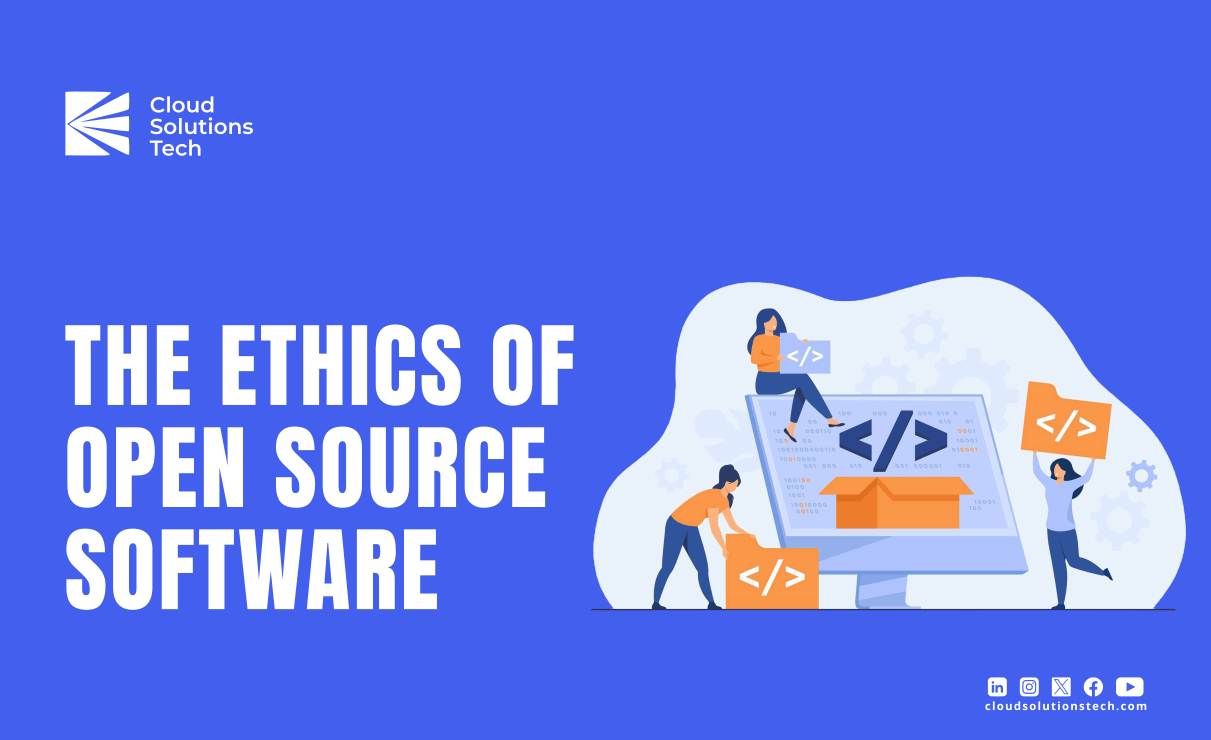The Ethics of Open-Source Software
You’re probably familiar with the concept of open-source software, even if you don’t realize it. It’s that free stuff you can download from the internet, right? Well, yes and no.
Open-source software is indeed freely available, but it represents much more than just a cost-saving measure. With great freedom comes great responsibility, and the ethical landscape of OSS is complex. While the benefits of open-source software are widely recognized (cost-effectiveness, security, customization), the ethical implications deserve deeper consideration.
Some Key Considerations
- Sharing vs. Stealing
The core principle of OSS is sharing, but where does that line blur into stealing? Imagine you contribute code to a project, and later, a company uses it to create a commercial product without giving back. This raises ethical concerns about fair compensation and the proper use of contributions.
- Security Vulnerability
The open nature of OSS can make it vulnerable to security threats. Hackers might exploit publicly available code, exposing users to risks. However, the open community can also be a strength, as many eyes can scrutinize code for vulnerabilities, leading to faster fixes.
- Who Pays the Bills?
Who benefits and how? Developing and maintaining software takes time and resources. While OSS projects often rely on volunteers, the question arises: who funds the infrastructure, bug fixes, and ongoing development? Developers spend countless hours crafting software, but with OSS, the financial rewards aren’t always direct. While some contribute for intrinsic reasons, others might struggle to justify their efforts without compensation.
The ethical question lies in balancing the benefits of open access with fair recognition and potential financial gain for developers. Sustainable funding models are crucial for the long-term health of OSS projects.
- Licensing
OSS projects use various licenses, each with different terms and conditions. Understanding these licenses is crucial for both contributors and users. Some licenses allow for commercial use, while others restrict it. Choosing the right license impacts the project’s direction and community engagement
- Walking the Line Between Community and Conflict
Open-source communities are like bustling marketplaces – diverse, passionate, and sometimes prone to disagreements. if a thriving OSS community thrives on collaboration and respect, balancing individual contributions with the project’s direction can be tricky.
Establishing clear community guidelines and fostering an inclusive environment are essential for ethical development. Ethical considerations lie in fostering respectful communication, clear decision-making processes, and valuing diverse perspectives, much like establishing traffic rules for the marketplace, ensuring everyone gets heard while the project moves forward smoothly. However, issues like discrimination, harassment, and unfair treatment can arise. And that’s where we might have a problem.
Some Actionable Steps
- Contribute responsibly: Look for projects with clear governance models, transparent funding sources, and inclusive communities. Understand the license and community guidelines before contributing code.
- Put your money where your ethics are: It goes without saying.
- Promote diversity & inclusion: Support initiatives that aim to increase representation and participation from underrepresented groups.
- Educate Yourself: Stay informed about emerging issues, best practices, and case studies related to ethics in OSS.
- Address Ethical Issues: If you encounter ethical issues or concerns within an open-source project, report them to the project maintainers or relevant authorities.
- Educate Others: Share resources, articles, and educational materials with your peers to raise awareness and promote ethical behavior within the community. Talk about the ethics of OSS and encourage responsible participation. Lead by example.
Open-source software isn’t just about saving money (although that’s a nice perk!), and the goal isn’t to paint a bleak picture of OSS. On the contrary, these questions highlight the very things that make OSS unique and the ethical considerations that come with this powerful development model.
If and when we understand these issues, we can contribute to a more sustainable, responsible, and ethical future for open-source software, don’t you think?
